'I risked everything to dance in Iran'
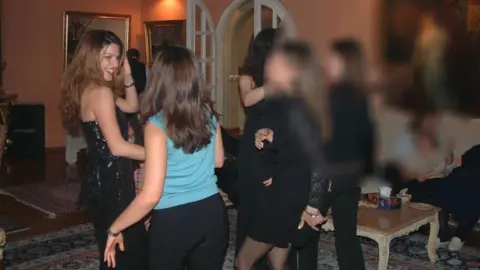 Feranak Amidi
Feranak AmidiThe arrest in Iran of an Instagram star who posted videos of herself dancing underscores the Islamic republic's strict rules shunning so-called Western behaviour. Here, BBC World Service women's affairs reporter Feranak Amidi describes what happened to her when she danced in Iran.
I grew up in Iran in the 1980s, in a period of difficult change for many in the country after the 1979 Islamic Revolution.
These were the years when morality police were put on the streets, and when music, lipstick, nail polish and even colourful clothes were banned.
It was the time of the 1980-88 Iraq-Iran war, food was rationed and blackouts were regular.
But even during those dark days, I remember dancing with my friends to music on cassettes bought from illegal music "dealers".
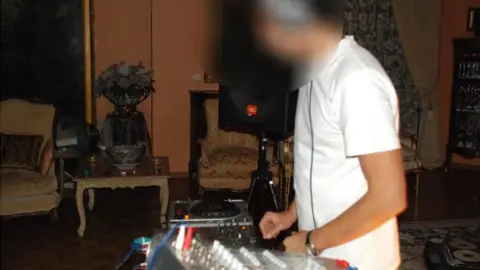 Feranak Amidi
Feranak AmidiThese dealers were our only window to the outside world. They provided us with the music of Iranian pop stars who had left the country after the revolution and had gone to Los Angeles.
These "dealers" were responsible for introducing us to the songs of Michael Jackson and keeping us up-to-date with trends such as break-dancing and groups like Wham!
At school we danced at every chance we got. Every time teachers were not around we sang and danced, even though we were aware of an unwritten rule that dancing was now banned.
Driven underground
Dancing itself has not been defined as a crime in Iran's penal code but the law is pretty vague.
Based on Iran's constitution, committing an "indecent" act in public is a crime, so dancing in public can be interpreted as an indecent act and punished.
Dancing can be performed on stage in Iran, although only by men.
Using social media platforms to "spread and encourage indecency" is also a crime in Iran's penal code.
In the absence of clubs and bars, parties in Iran have been the one place where people can dance and freely socialise - though such parties are technically breaking the law.
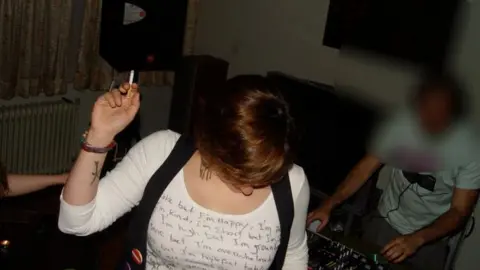 Feranak Amidi
Feranak AmidiThese "underground" parties started immediately after the revolution and no force has ever been able to stop them.
Many are family parties or weddings, but they are happening more and more in different cities so that young people can get together to drink, listen to music and dance.
'People were screaming'
When I finished high school in the late 1990s, an underground rave scene was forming in Tehran. We smuggled in techno and house CDs when coming back from holidays abroad.
On weekends we gathered at someone's basement or villa, played music and danced.
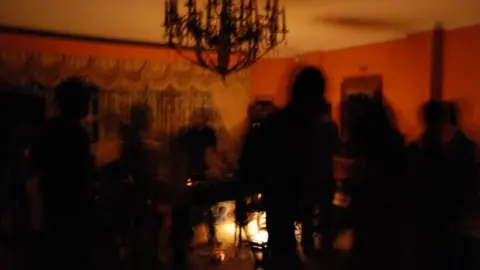 Feranak Amidi
Feranak AmidiBut many of these parties were raided and most of my friends and I have been jailed at least once for attending an underground party.
If a party is busted and alcohol is found, "culprits" can end up getting corporal punishment.
I know many people who received up to 100 lashes after a night out.
I was once at a party in Shemshak, an hour's drive from Tehran. We nicknamed it "Shibiza", after the world-famous party resort of Ibiza.
The room was dark and the strobe light was the only thing that made the other dancers visible to us every few seconds.
In one flash of light I saw an unfamiliar bearded face on the dancefloor, followed by another flash and an unfamiliar aggressive face.
All of a sudden the lights were on. People were screaming and running around. The party was raided by the hardline Basij militias, a volunteer security force.
They had batons and were smashing things. My friends and I locked ourselves in the bathroom. We could hear women screaming and crying, and men begging for forgiveness.
The pandemonium went on for an hour - and then there was silence.
We opened the door to find our friends sitting on the ground in silence, their faces wet with tears.
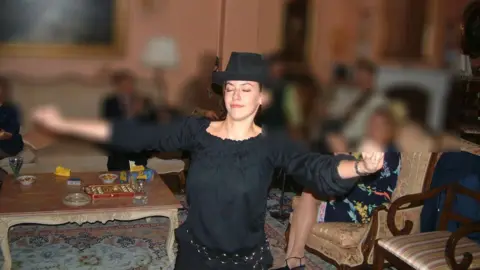 Feranak Amidi
Feranak AmidiThe militia had taken the host outside, then 30 minutes later he returned, shouting triumphantly.
"It is our lucky night," he said, "they were only after money!" The music was back on and we continued to dance until dawn.
Ever-inventive
Raids and arrests never stopped us from going to the next party - it just made us more creative in how to avoid the authorities.
We paid off police officers, made sure cars were not parked outside the venue and kept the guest list strictly limited to friends.
We used mattresses to conceal the windows to keep the music from sounding outside.
We continued all this because we didn't believe what we were doing was inherently wrong.
Today, young Iranians are still taking challenging social norms and breaking taboos in many ways. The social media campaign in support of arrested Instagram dancer Maedeh Hojabri is just one of them.
Every once in a while there is a crackdown, but these young influencers keep coming back and new ones pop up all the time. It's the same show of defiance as we displayed partying a generation before.
